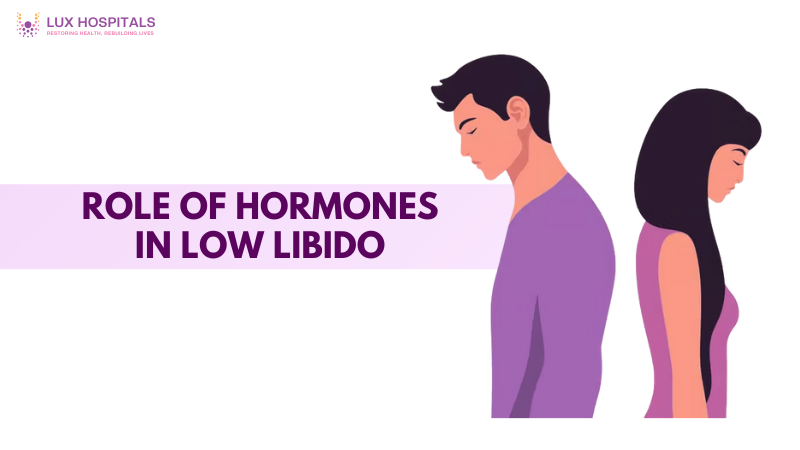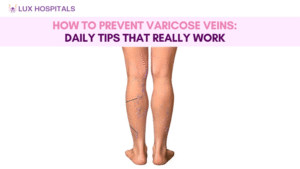Hormonal Imbalance and Low Libido: Signs, Causes, and Treatment

Low libido, or a reduced interest in sexual activity, is a common concern that can affect both men and women at various stages of life. Hormonal imbalance is one of the main, yet sometimes disregarded, causes of low libido. Your intimate health might be significantly impacted by any interruption in the hormones that regulate sexual desire. This blog examines the effects of hormones on libido, symptoms of imbalance, and strategies for reestablishing a healthy sex desire.
Understanding Libido and Its Importance
Libido refers to your overall sexual drive or desire for sex. Physical, emotional, and psychological variables impact it, with hormones acting as the central regulators. Intimacy, general emotional wellness, and self-confidence depend on good libido. Relationship tension, low self-esteem, and even signs of anxiety or depression might result from a decline in libido.
Hormones That Affect Libido
Hormones act as chemical messengers that control bodily functions, including sexual desire. Here’s how specific hormones affect libido:
- Testosterone: A vital hormone that has a direct impact on libido, testosterone is frequently linked to men but can also be found in women. A noticeable drop in sexual attraction might result from low levels.
- Estrogen: This hormone is vital for women, especially in maintaining vaginal lubrication and comfort during sex. Estrogen levels dropping, especially during menopause, can reduce libido.
- Progesterone: High levels of progesterone can suppress sexual desire, particularly in women during certain phases of the menstrual cycle or pregnancy.
- Libido: Low levels can cause a notable decline in sexually disrupted hormonal balance, which can lower libido over time.
- Thyroid Hormones: Hypothyroidism or hyperthyroidism can cause hormonal imbalances that lead to fatigue, weight changes, and reduced sexual desire.
Each hormone interacts with the brain and body in complex ways, and even a slight imbalance can majorly impact your libido.
How Hormonal Imbalances Cause Low Libido?
When the bloodstream contains too much or too little hormone, hormonal imbalances result. This may be brought on by aging, stress, long-term sickness, or certain drugs. For instance :
- Men with low testosterone may experience erectile dysfunction and reduced libido.
- Women during perimenopause or menopause often have fluctuating estrogen and progesterone levels, leading to vaginal dryness and decreased interest in sex.
- People with thyroid disorders may feel constantly tired or depressed, affecting their overall sexual appetite.
Your brain’s ability to communicate with your reproductive organs is compromised when your hormones are out of balance, which lowers your libido.
Signs and Symptoms of Hormonal Imbalance
Identifying a hormonal imbalance early can help prevent long-term issues with libido. Common symptoms include:
- Fatigue and low energy
- Mood swings or depression
- Weight gain or loss
- Irregular menstrual cycles in women
- Erectile dysfunction in men
- Sleep disturbances
If these symptoms accompany a persistent drop in libido, it may be time to consult a healthcare provider.
Diagnosing Hormonal Causes of Low Libido
Doctors usually begin with a medical history and physical exam to diagnose the hormonal cause of low libido. Blood tests can measure hormone levels such as testosterone, estrogen, thyroid hormones, and cortisol. In some cases, additional tests like pelvic exams, ultrasounds, or pituitary function tests may be recommended. Diagnosing the root cause is crucial for selecting the most effective treatment plan to restore libido.
Treatments for Hormonal Imbalance and Low Libido
Treating hormonal imbalance can often reverse low libido. Available treatments include:
- Hormone Replacement Therapy (HRT): Common for both men (testosterone therapy) and women (estrogen or progesterone replacement), HRT can restore hormonal balance and improve sexual desire.
- Thyroid Medication: Hormone therapy can raise libido and restore thyroid levels in those with thyroid disorders.
- Stress Management: Reducing stress through lifestyle changes or therapy helps lower cortisol levels and restore hormonal harmony.
- Lifestyle Modifications: Regular exercise, a healthy diet, sleep hygiene, and reduced alcohol intake can naturally balance hormones and enhance libido.
Consulting a specialist in hormone health or endocrinology is essential to customize treatment.
When to See a Doctor?
Consider consulting a healthcare provider if you experience any of the following symptoms:
- Persistent low libido lasting for more than a few weeks with no apparent cause.
- Fatigue, mood swings, or sleep disturbances that accompany reduced sexual desire.
- Erectile dysfunction or vaginal dryness and discomfort during intercourse.
- Irregular menstrual cycles or missed periods may signal a hormonal imbalance.
- Difficulty maintaining intimate relationships due to a lack of interest in sex.
- Prolonged anxiety or tension that gets in the way of your ability to feel sexual desire.
- Concerns about hormone replacement therapy (HRT) or other treatments for improving libido.
Early diagnosis and treatment can help identify underlying hormonal causes and restore healthy libido and overall sexual well-being.
Conclusion
Low libido could be the result of a serious but treatable hormonal imbalance. You can proactively enhance your sexual health by knowing how hormones like cortisol, estrogen, and testosterone function. There are strategies to restore your libido, including changing your lifestyle or taking medication. Don’t be afraid to get professional help and take charge of your health if you think your hormones are influencing your desire.
Frequently Asked Questions
Yes, hormonal imbalance is a leading cause of low libido. Hormones like testosterone, estrogen, and thyroid hormones directly influence sexual desire. When these hormones are out of balance, sexual interest can significantly decline.
Signs like fatigue, mood changes, irregular periods, or erectile dysfunction can indicate hormonal issues. Blood tests can confirm if hormones like testosterone or estrogen are imbalanced. If these symptoms coincide with low libido, hormones may be the cause.
Testosterone is the primary hormone responsible for libido in both men and women. Estrogen also plays a role in women, especially during reproductive years. Other hormones that could indirectly affect sexual desire include cortisol and thyroid hormones.
A healthy diet, stress management, exercise, and sleep naturally increase libido. These behaviors improve general well-being and aid in hormone regulation. Sometimes, people utilize herbal supplements like ginseng or maca root, but they should be taken with
Yes, once the underlying cause is found, decreased libido is frequently treatable. Strategies that work include lifestyle modifications, medication adjustments, and hormonal therapy. For individualized care, it's critical to collaborate with a healthcare professional.




















